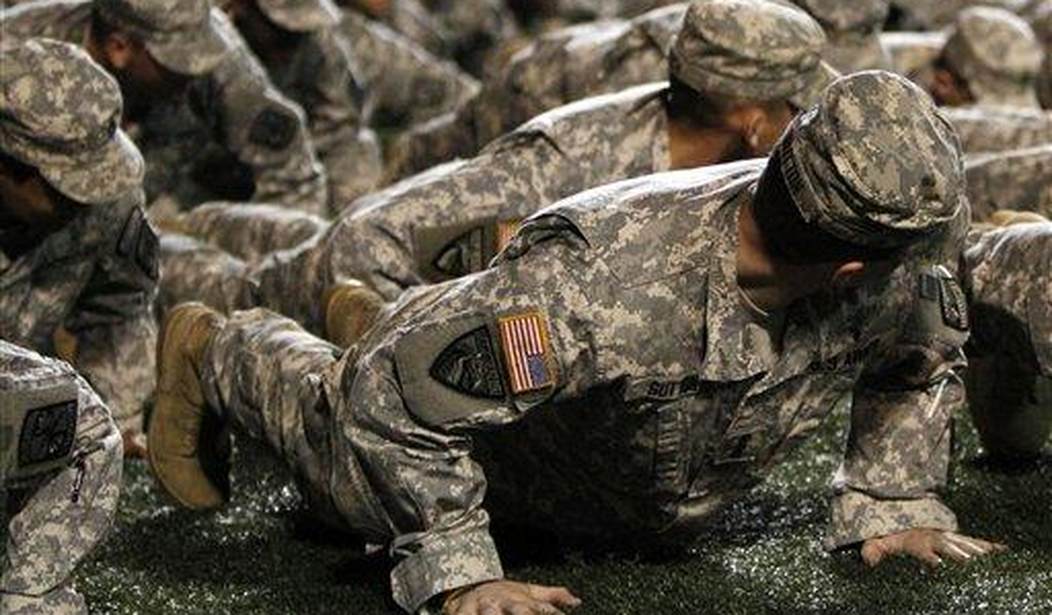Why do ‘Shark treatment’ (or shock treatment as it was once known) on those attending Army Basic Training? Why scream at new recruits getting off a bus? Why have them crawl through sawdust pits or do pushups in the snow in the middle of the night? The U.S. Army recently decided to end the practice “towards a kinder, gentler start.” But that's a wrong-headed approach.
For starters, trainees are not soldiers; there are four tests each individual must pass in order to earn that title.
Each trainee must qualify (achieve a minimum score) with a rifle. The M-16 rifle was in use when I enlisted. Today, it is the M-4 rifle. They must pass an Army Physical Fitness Test (APFT or simply, PT test) which has changed a number of times over the years. (When I enlisted in 1974, there were five APFT events. Each event had to be passed with a minimum of 60 points: Pushups, Sit Ups, Horizontal Ladder, One-Mile Run, and the Dodge, Run, and Jump.)
They also must pass the Skill Qualification Test (SQT) which tests basic soldier skills. The latter includes testing a trainee’s ability to disassemble and reassemble a rifle, communicate, maneuver on foot, read a map, conduct first aid, and operate on the battlefield where nuclear, chemical, and biological weapons are used.
When I first enlisted, trainees were familiarized in basic weapons such as the bayonet, crew-served machinegun, an anti-armor missile, and several types of hand grenades. In addition, Basic Training included familiarization in General Orders, the Rules of War, Geneva Conventions, field sanitation, hygiene, the use of cover and concealment, camouflage techniques, to move as a member of a dismounted squad, to suppress enemy fire, and other important combat skills. Yet these were not tested, per se. A trainee merely attended the training and, at some point during it demonstrated an understanding of what had been taught.
Recommended
The hardest test was proving to their Drill Sergeants they were willing and able to be a soldier. One might wonder how they measured that. It is a fair question.
In the typical workplace, individuals demonstrate by their actions their character, work ethic, ability, and willingness to do the job they were hired to do, and to be responsible in their duties.
A Drill Sergeant must assess whether a trainee will defend our nation during combat. And they may later be deployed with those same troops. A soldier must stand and fight, and not run or surrender while they still have the ability to fight.
The Army is not some fast food joint. Flipping burgers is not the same as fighting and perhaps dying in meat grinders, battles with names like Hamburger Hill, The Frozen Chosen, Gettysburg, Belleau Woods, Khe Sanh, Guadalcanal, Salvo Island, the Ploesti oil fields, Operation Red Wing, and hundreds of other air, land, and sea battles anyone with a fair sense of America’s military history could name.
America wants its military to fight and win. We rightfully expect our troops to be highly trained, well equipped, expertly led, and cared for humanely. Yet no one can guarantee they will return unharmed.
What a Drill Sergeant owes each trainee is what I call a soldier’s chance.
They must instill discipline within them, train them to fight effectively, and ensure they will follow their oath to defend our nation against all enemies, both foreign and domestic, and obey the orders of those appointed over them.
That's why I say continue shark treatment. You want every soldier to be able to follow their training during those moments of extreme stress, to give them the best chance to fight, win, and survive on the modern battlefield when the bullets and bombs are flying in every direction, and when the enemy is trying to take their lives and freedom.
How does a Drill Sergeant measure a trainee’s willingness and ability to do those things under fire on a battlefield without placing them under extreme stress and training them while they are being subjected to it? You can roll out all the studies, research papers, and surveys authored by Generals, Admirals, and PhDs you want, but they all become kindling for a campfire at first contact with the enemy. A Drill Sergeant measures it by training troops under pressure and ensuring they perform.
Do ‘Shark treatment’ because trainees enlist to take a soldier’s chance.

























Join the conversation as a VIP Member